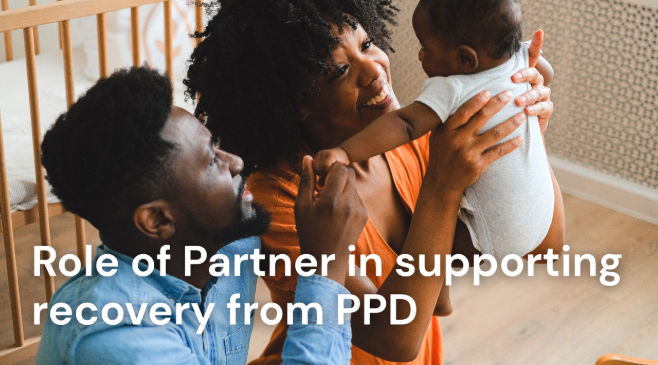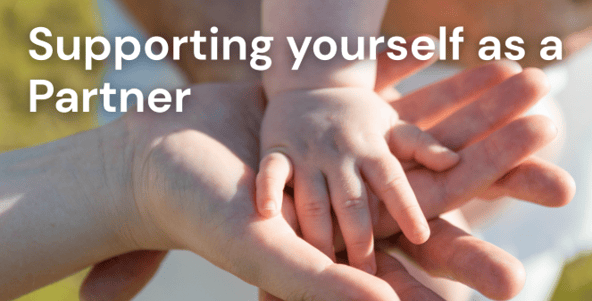The Role of the Father or Partner in Supporting Recovery from Postpartum Depression
7/1/20254 min read
When a new parent experiences postpartum depression (PPD), their world narrows. Joy is replaced by despair, routine becomes overwhelming, and connection feels out of reach. But while most discussions about PPD center on the mother or birthing parent, one critical voice is often left out: the partner.
Whether it's a father, co-parent, spouse, or committed partner, this person plays a vital yet often overlooked, role in supporting recovery from PPD. Their presence, patience, and understanding can be a powerful catalyst for healing. And equally important: they need support too.
At Peace Temple, we believe postpartum recovery is a family affair. PPD doesn’t happen in a vacuum, and neither does recovery. In this article, we explore how partners can show up meaningfully, practically, and emotionally to support the one they love through PPD.


Understanding What PPD Really Feels Like
First, let’s clarify something crucial: PPD is not simply sadness or “baby blues.” It’s a serious mental health condition that can include:
Persistent hopelessness or numbness
Irritability or emotional outbursts
Fatigue, overwhelm, or brain fog
Disconnection from the baby or self
Guilt, shame, or thoughts of being a “bad parent”
Intrusive or disturbing thoughts
Partners may witness these changes and feel shocked or helpless. The person they love might seem like a stranger, emotionally distant or unusually withdrawn.
This isn’t personal. It’s physiological and emotional distress. And recognizing this can shift a partner’s role from confused observer to active, compassionate participant in healing.
Why the Partner’s Role Matters So Much
Research consistently shows that partner support is one of the strongest protective factors in PPD recovery. A supportive partner can:
Reduce feelings of isolation
Encourage early treatment
Help distribute caregiving responsibilities
Provide emotional safety and reassurance
Increase the likelihood of long-term recovery
At Peace Temple, we help partners understand that support is not about fixing—it’s about being present, patient, and consistent.
How Partners Can Support Recovery from PPD
1. Learn About PPD Without Judgment
Start by educating yourself. The more you know, the more empathy and clarity you’ll bring into your relationship.
Try:
Reading about symptoms and causes
Listening to your partner’s lived experience
Attending a session with a therapist or perinatal counsellor
Avoid jumping to solutions. Instead, focus on understanding what they’re experiencing and acknowledging that it’s real.
2. Offer Emotional Safety, Not Advice
You don’t need the perfect words. In fact, often the most powerful support is simply listening without trying to fix.
Instead of saying:
“Just try to get more rest.”
“Other moms seem to handle this fine.”
“You’re overthinking everything.”
Try :
“I see that you’re struggling. I’m here for you.”
“You’re not alone. We’ll get through this together.”
“How can I support you today?”
At Peace Temple, we teach partners how to become emotional anchors—steady, non judgmental, and emotionally present.


3. Support Without Being Asked
PPD often paralyzes motivation and decision-making. Don’t wait to be asked—look for ways to relieve stress proactively:
Take over night time feedings when possible
Handle scheduling of doctor or therapy appointments
Make meals or prep snacks
Create opportunities for them to rest or be alone without guilt
Small actions say, “You’re not in this alone.”
4. Watch for Warning Signs of Crisis
While most PPD is manageable with support and therapy, some symptoms indicate a need for urgent help, such as:
Expressions of hopelessness or suicidal thoughts
Signs of detachment from the baby or self
Hallucinations or delusions (possible signs of postpartum psychosis)
If you notice these, seek professional help immediately. Peace Temple’s clinical team is equipped to help families navigate crisis moments with care and discretion.
5. Normalize and Encourage Mental Health Care
The decision to start therapy or medication can feel shameful for someone struggling with PPD. A partner’s encouragement can make the difference between suffering in silence and getting help.
Try saying:
“Would it feel okay if we explored therapy together?”
“There’s no shame in getting support—you deserve to feel better.”
“I’ll help make the appointment if it feels overwhelming.”
Normalize mental health treatment as a form of strength, not weakness.
Supporting Yourself as a Partner
It’s also essential to name the truth: partners often suffer quietly too.
You might feel :
Helpless or inadequate
Overburdened by responsibilities
Emotionally neglected
Confused or even resentful
These feelings are valid. Supporting someone through depression can be draining—and you need support too.
What helps :
Talking to a therapist or counsellor
Attending support groups for partners
Taking breaks when possible
Journaling or finding a safe space to process your own emotions
At Peace Temple, we encourage partners to seek their own healing, recognizing that a healthy relationship starts with two supported individuals.
Rebuilding Connection: Small Steps Toward Intimacy
When PPD is present, intimacy often fades—not just sexual, but emotional and relational closeness. Here’s how to begin rebuilding trust and connection:
Spend quiet time together, even if it’s just watching a show
Send a kind message or leave a note, reminding them of your care
Hold hands, hug, or offer physical presence—only when welcomed
Celebrate progress, no matter how small (e.g., “You got out of bed today. That’s huge.”)
Recovery isn’t linear. There will be setbacks. But when partners remain present, compassionate, and committed, reconnection becomes not just possible—but deeply meaningful.
Final Thoughts: You Are Part of the Healing
Postpartum depression changes a lot—but it doesn’t mean the end of closeness, connection, or partnership. In fact, it can be an opportunity to learn new ways of loving each other through the hard seasons.
At Peace Temple, we believe that partners are not bystanders in postpartum recovery. They are witnesses, caregivers, and sources of profound strength. And with the right tools, they can be part of the healing journey—not just for their partner, but for themselves and their family.
So if you’re reading this as a partner wondering how to help, here’s what we want you to know:
You don’t need to fix it.
You just need to stay.
Stay curious, stay kind, stay connected.
And healing will follow.
